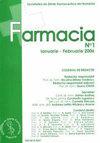THE DEVELOPMENT OF A BRAIN TARGETED MUCOADHESIVE AMISULPRIDE LOADED NANOSTRUCTURED LIPID CARRIER
IF 1.4
4区 医学
Q4 PHARMACOLOGY & PHARMACY
引用次数: 0
Abstract
This research aimed to create and refine intranasal mucoadhesive amisulpride-loaded nanostructured lipid carriers (AMS-MNLCs) to increase efficacy and safety by increasing nasal-mucosal adhesion and facilitating direct brain targetability. Using HPMC K4M, Carbopol 934, and Hyaluronic acid (HA), AMS-MNLCs were made by applying modified melt-emulsification and ultra-sonication procedures. The results of the pH, osmolarity, and mucoadhesive tests on the optimized formulation were 6.3 ± 0.02, 304.53 ± 2.15, and 26.07 ± 0.37, respectively. Rheological investigation, in-vitro release and ex-vivo permeation study of the optimized formulation revealed a shear-thinning behaviour, significantly higher release, and the flux of the drug from the formula was 975.2 ± 12.45. Based on the pharmacokinetic analyses in rats, intranasal AMS-MNLCs were reported to have a brain C max about 14 times higher than intravenous AMS-solution. In addition, two weeks of intranasal administration of formulation did not affect haematological parameters in the in vivo research. The histopathological investigation showed that there was no disruption of the naso-mucosal membrane structure. Therefore, the created and optimized intranasal MNLCs showed a promised venue for the efficient and secure delivery of AMS as an antiemetic drug for the prevention and treatment of preoperative nausea and vomiting (PONV).开发出一种脑部靶向粘液黏附性阿米舒必利纳米结构脂质载体
本研究旨在创建和改进鼻内粘附性阿米舒必利纳米结构脂质载体(AMS-MNLCs),通过增加鼻腔粘膜粘附性和促进大脑直接靶向性来提高疗效和安全性。使用 HPMC K4M、Carbopol 934 和透明质酸 (HA),通过改良的熔融乳化和超超声程序制成了 AMS-MNLC。优化配方的 pH 值、渗透压和粘附性测试结果分别为 6.3 ± 0.02、304.53 ± 2.15 和 26.07 ± 0.37。对优化配方进行的流变学研究、体外释放和体内渗透研究表明,该配方具有剪切稀化行为,释放量显著增加,药物从配方中的通量为 975.2 ± 12.45。根据在大鼠体内进行的药代动力学分析,鼻内 AMS-MNLCs 的脑 C max 值是静脉注射 AMS 溶液的 14 倍。此外,在体内研究中,两周的配方鼻内给药不会影响血液学参数。组织病理学调查显示,鼻黏膜结构没有受到破坏。因此,经过创制和优化的鼻内 MNLC 为高效、安全地输送 AMS 作为止吐药预防和治疗术前恶心和呕吐(PONV)提供了可行的途径。
本文章由计算机程序翻译,如有差异,请以英文原文为准。
求助全文
约1分钟内获得全文
求助全文
来源期刊

FARMACIA
医学-药学
CiteScore
2.40
自引率
50.00%
发文量
59
审稿时长
6-12 weeks
期刊介绍:
FARMACIA publishes original research papers, invited topical reviews and editorial commentaries and news, with emphasis on conceptual novelty and scientific quality. Main research areas are focused on: pharmacology, toxicology, medicinal chemistry, biopharmacy, drug design, drug delivery, personalized medicine, nanostructures, nutraceuticals, biochemistry and biotechnology. Manuscripts submitted to the Journal are only accepted after the peer review precess. The papers should have not been published in any other journal. The recommendations of the Declaration of Helsinki, for humans, and the International guidelines as accepted principles for the use of experimental animals should be followed.
 求助内容:
求助内容: 应助结果提醒方式:
应助结果提醒方式:


